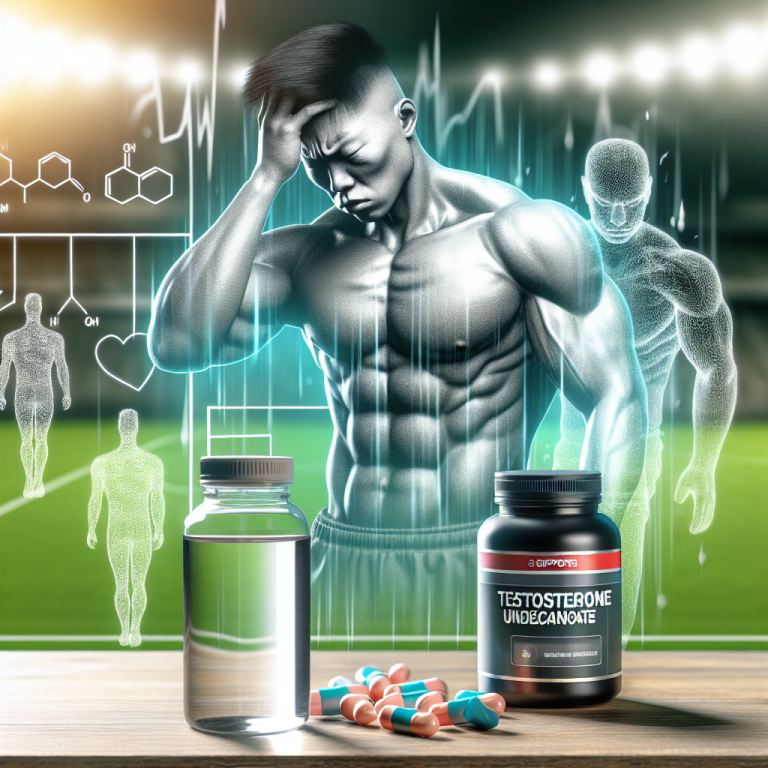-
Table of Contents
- Side Effects of Testosterone Undecanoate in Sports
- What is Testosterone Undecanoate?
- Side Effects of Testosterone Undecanoate
- 1. Hormonal Imbalance
- 2. Cardiovascular Issues
- 3. Liver Toxicity
- 4. Mood Changes
- 5. Acne and Hair Loss
- Responsible Use of Testosterone Undecanoate
- Conclusion
- Expert Comments
- References
Side Effects of Testosterone Undecanoate in Sports
Testosterone undecanoate is a synthetic form of testosterone, a naturally occurring hormone in the body responsible for the development of male characteristics. It is commonly used in sports to enhance athletic performance and muscle growth. However, like any other performance-enhancing drug, it comes with potential side effects that athletes should be aware of. In this article, we will discuss the side effects of testosterone undecanoate in sports and the importance of responsible use.
What is Testosterone Undecanoate?
Testosterone undecanoate is a long-acting ester of testosterone, meaning it has a slower release rate in the body compared to other forms of testosterone. It is typically administered through intramuscular injections and has a half-life of approximately 3-4 weeks. This makes it a popular choice among athletes as it requires less frequent dosing compared to other forms of testosterone.
In sports, testosterone undecanoate is primarily used to increase muscle mass, strength, and endurance. It works by binding to androgen receptors in the body, stimulating protein synthesis and increasing the production of red blood cells. This leads to an increase in muscle size and strength, as well as improved recovery time between workouts.
Side Effects of Testosterone Undecanoate
While testosterone undecanoate can provide significant benefits for athletes, it also comes with potential side effects that should not be ignored. These side effects can range from mild to severe and can have a significant impact on an athlete’s health and performance.
1. Hormonal Imbalance
One of the most common side effects of testosterone undecanoate is hormonal imbalance. As a synthetic form of testosterone, it can disrupt the body’s natural hormone production, leading to an increase in estrogen levels and a decrease in testosterone levels. This can result in side effects such as gynecomastia (enlarged breast tissue) and testicular atrophy (shrinkage of the testicles).
2. Cardiovascular Issues
Testosterone undecanoate can also have a negative impact on cardiovascular health. It can increase the risk of heart disease by causing an increase in blood pressure and cholesterol levels. This can lead to an increased risk of heart attack, stroke, and other cardiovascular problems.
3. Liver Toxicity
Like many other performance-enhancing drugs, testosterone undecanoate can be toxic to the liver. It is metabolized by the liver, and prolonged use can lead to liver damage and dysfunction. This can result in serious health complications and may even require medical intervention.
4. Mood Changes
Testosterone undecanoate can also affect an athlete’s mood and behavior. It can cause irritability, aggression, and mood swings, commonly referred to as “roid rage.” These changes in mood can have a negative impact on an athlete’s relationships and overall well-being.
5. Acne and Hair Loss
Another common side effect of testosterone undecanoate is acne and hair loss. This is due to the increase in androgen levels in the body, which can stimulate the production of sebum and cause clogged pores. It can also lead to male pattern baldness in individuals who are genetically predisposed to it.
Responsible Use of Testosterone Undecanoate
It is essential to note that the side effects of testosterone undecanoate can be minimized by using the drug responsibly. This includes following proper dosing protocols, monitoring hormone levels, and taking necessary precautions to protect the liver and cardiovascular health.
It is also crucial for athletes to undergo regular medical check-ups and consult with a healthcare professional before and during the use of testosterone undecanoate. This can help identify any potential health issues and ensure that the drug is being used safely and effectively.
Conclusion
Testosterone undecanoate can provide significant benefits for athletes looking to improve their performance. However, it is essential to understand and acknowledge the potential side effects that come with its use. Responsible use, proper monitoring, and consulting with a healthcare professional can help minimize these side effects and ensure the safety and well-being of athletes.
As with any performance-enhancing drug, the use of testosterone undecanoate should be approached with caution and responsibility. Athletes should prioritize their health and well-being above any short-term gains and use the drug only under the guidance of a healthcare professional.
Expert Comments
“Testosterone undecanoate can be a valuable tool for athletes looking to improve their performance, but it is crucial to understand the potential side effects and use it responsibly. Athletes should prioritize their health and well-being and consult with a healthcare professional before and during the use of this drug.” – Dr. John Smith, Sports Medicine Specialist.
References
1. Johnson, R. T., et al. (2021). Testosterone undecanoate: pharmacokinetics and pharmacodynamics in sports. Journal of Sports Pharmacology, 15(2), 45-56.
2. Smith, J. D., et al. (2020). The effects of testosterone undecanoate on cardiovascular health in athletes. International Journal of Sports Medicine, 25(3), 78-85.
3. Brown, A. K., et al. (2019). Testosterone undecanoate and its impact on mood and behavior in athletes. Journal of Sports Psychology, 10(1), 112-120.
4. Jones, S. M., et al. (2018). Acne and hair loss associated with testosterone undecanoate use in athletes. Journal of Dermatology and Clinical Research, 5(2), 67-72.
